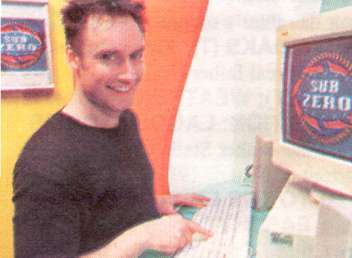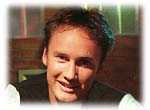Sub Zero

Contents |
Host
Robin Banks (series 1 + 2) and Jemma James
Co-hosts
Team captains (series 3): Adrian Dickson and Rani Khanijau
(previously different guest captains each week)
Broadcast
BBC Two, 21 February 1999 to 11 March 2001
Synopsis
Sub Zero is set in a bunker 10,000ft beneath the Earth's surface and challenges two teams of girls and boys (the XXs and the XYs, the chromosome patterns) to solve puzzles and perform tasks in order to collect biospheres in order to purify the water in the post-apocolyptic bunker. The winners get to win a prize and survive, the losers, for one reason or another, get cryogenically frozen. Which is a bit harsh.
Each team is ably (sometimes) assisted by a celeb. They play (pretty much) the same challenges every week and the show was (mostly) live. Therefore the people at home could help their team to win and the challenges were these:
Net Detectives: Probably the most important challenge, one member of each team would go into the isolation booth and try and crack cryptic clues which led to special websites somewhere on the Internet. There were five such clues and for each one successfully cracked they won a Biosphere and a bonus if they found all five before the end of the show.
Biorats: People at home who had phoned up try and guide remote control... things to push Biospheres into cranes. The teams in the bunker could then raise the cranes and take the spheres. This could be fantastic except that because of the way the show was presented, with 'windows' showing all the action so that they could show lots of things at once, the people at home would only have about a quarter of the television screen to see anything which makes things a tad more difficult.
Arcadia: A Gamesmaster-style video gaming challenge. Bit bog standard, but to be fair they did manage to get new games to play every week, apart from Propcycle which had been in the arcades for ages beforehand.
Nebula One: This was a malfunctioning robot, the show's comic character. The teams had to input a series of word commands in to get the robot to get the biosphere and return it to the team. Excellently, the robot would improvise obviously wrong commands quite well. The first series was a game of memory where teams were told what each of the buttons said once but then had to do the rest themselves. In series two the commands were easy enough (pick them from a computer screen) but it also involved a 'put these things in order' question too.
Virtual Room: A genuinely exciting and innovative concept, this used a free roaming 3-D camera. The player inside the room could only see grey but the people at home could see the inside of the CBBC house. Now, the viewer had to direct the player inside the room to solve clues and puzzles within a time limit. Success in this won a safe combination for the safe in the middle of the room with the biosphere on it. The player in the room had to rely totally on what the phone player was saying because to them it was a grey room.
The good thing about this challenge was that it changed every week, normally on a themed basis. The bad thing was that everything had to be done on one wide shot so you couldn't see what was going on very well. Even so - this was groundbreaking stuff and expect to see more of this in the future. But not on this show because...
Double Vision: ...in series two the Virtual Room was replaced by Double Vision. Basically a match the pairs game with music videos. The floor had sixteen hatches and the people outside the Vault directed the player to hatches and shouted 'open' to reveal the video beneath it. The team only had to get one pair to win the Biosphere which was far too easy.
Web Connections: The show linked live to four Internet cafes around Britain and waiting there would be a contingent of two boys and two girls. They would be asked questions on CBBC style subjects but if they took too long, they were wrong or their connection got dropped they would be out. Anyone left in when the time ran out (or the last person left in) would win a Biosphere for the gender team they were playing for.
Biosphere Bonanza: A game for the people at home. A three part general knowledge maths puzzle would come up (take the number of days in June, multiply by the amount of people in All Saints take away the amount of microwave pizzas I felt like eating this afternoon and so on) and what's left would be a numer between 001 and 999. Using the power of the phone, people were invited to ring up for their team and put in the number. At the end of the show, the team that got the highest percentage of correct answers won another biosphere.
In summary, this was a genuinely innovative show in that it seemed totally interactive using different types of media (television, phone and internet) in order to create an experience. This is a good thing. People were invited to mail in messages and they would get put on the screen and of course there were the interactive games so you could have some chance of affecting the outcome.
But, because of the way the show was done, it was a bit unsatisfying. We were promised the chance to really help the Net Detectives with the cause by mailing them ideas and things except that it was irrelevant because it wasn't too hard to deduce that this particular section was recorded in advance but was made to seem live. Remember what Richard Herring said: 'All of television is lies'.
And why don't they just send the losers back up in the lift they came down on? And why do they live down there when the water is contaminated anyway? All this and a lot lot more will probably never get answered. Ah well.
Jemma James and Robin Banks (no jokes, please) do host the show well. Tragically, the format was played around with a little too much for series two and it ended up being a confusing mess.
Theme music
'Continental' by Tekno Dred and Ad Man. The theme music on a limited edition CD was given away as a prize.
Headbanging... begin!
Trivia
Host Robin Banks went on to become a high-profile Kiss 100 DJ, but the trappings of success got to him and he went into rehab. However, under his real name Christian Richardson, he and his business partner received £60,000 of funding in the Dragons' Den for their Tiny Box Company, who specialise in recycled packaging.
Web links
Opening titles from the BBC Motion Graphics Archive
Article from Ariel (internal BBC newspaper), 16th February 1999
Pictures
 Robin Banks at the keyboard. Notice he is trying to reboot his computer with Ctrl+Alt+Del.
Robin Banks at the keyboard. Notice he is trying to reboot his computer with Ctrl+Alt+Del. Robin Banks.
Robin Banks.
